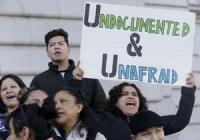-
Economic benefits of admitting, settling refugees outweigh costs
Although working-age adult refugees who enter the United States often initially rely on public assistance programs, a new study indicates that the long-term economic benefit of admitting refugees outweighs the initial costs. The researchers analyzed the costs and benefits of resettling an average refugee who entered the United States between 1990 and 2014, and found that within eight years of their arrival, adult refugees begin paying more in taxes than they receive in benefits.
-
-
DHS investigating questionable basketball recruiting practices at N.J. school
The basketball recruiting scandal at Paterson, New Jersey Eastside is going to occupy the headlines for a while yet. State criminal investigators were looking into recruiting improprieties at the school, and now federal immigration authorities have opened their own investigation. At least eight Eastside players have been brought to Paterson from Nigeria and Paraguay since 2011, with many living with coaches and others connected to the basketball programs in some form. This was done even though the district was unable to issue proper immigration documents for foreign students, which placed the athletes at risk of being deported.
-
-
Lawyers convention leaves Texas over state's new immigration law
A 15,000-member association of attorneys and law professors said on Wednesday that it is relocating its 2018 convention out of Texas in response to the state legislature passing Senate bill 4, a sweeping and controversial immigration enforcement measure. About 3,000 people were expected to attend the event.
-
-
New training to improve operational security at U.S. border
Drug smugglers, human traffickers, illegal immigrants, and even potential terrorists crossing the United States border do their best to, literally, cover their tracks. It is the responsibility of the United States Border Patrol (USBP) to pursue and apprehend these individuals. Without proper training, tracking people who do not want to be found is a nearly impossible task, and it can be extremely difficult even with training. S&T’s First Responders Group (FRG) has developed training to assist in increasing tracking abilities.
-
-
Germany failing to use language and dialect recognition tech to ID asylum-seekers, extremists: Critics
Critics in Germany say that the country’s immigration agency has failed to use a language recognition software which would have helped immigration agents identify the country of origin of asylum-seekers who have no other ID documents. German authorities could have also identified Islamist and far-right terror suspects earlier if available language recognition software was used, these critics say.
-
-
“Migrant work ethic” exists, at least in the short term

The received wisdom that migrant workers have a stronger “work ethic” than U.K.-born workers is proven for the first time. New research shows that migrant workers are over three times less likely to be absent from work than native U.K. workers, a measure which economists equate with work ethic.
-
-
739,478 visitors to U.S. in FY2016 overstayed their visas – and 628,799 are still in U.S.
DHS earlier this week released the Fiscal Year (FY) 2016 Entry/Exit Overstay Report. The report provides data on departures and overstays, by country, for foreign visitors to the United States who entered as nonimmigrant visitors through an air or sea Port of Entry (POE) and were expected to depart in FY16. CBP processed 50,437,278 in-scope nonimmigrant admissions at U.S. air and sea POEs who were expected to depart in FY16—of which 739,478 overstayed their admission, resulting in a total overstay rate of 1.47 percent. Of the more than 739,000 overstays, DHS determined 628,799 were suspected “in-country” overstays, resulting in a suspected in-country overstay rate of 1.25 percent. An individual who is a suspected in-country overstay has no recorded departure, while an out-of-country overstay has a recorded departure that occurred after their lawful admission period expired.
-
-
Border walls may pose serious challenges to biodiversity, but smaller challenges to humans
With the prospect of a U.S.-Mexico border wall looming, research and reporting on the ecological impacts of walls is both important and timely. Reporting in BioScience on such barriers’ known effects on wildlife, science journalist Lesley Evans Ogden describes the potential effects of the proposed structure along the 2000-mile U.S.-Mexico border. “If the wall is completed, it will create a considerable biodiversity conservation challenge—one unlikely to disappear anytime soon,” she writes.
-
-
ICE-led anti-gang campaign nets 1,378 arrests nationwide
A six-week nationwide gang operation led by U.S. Immigration and Customs Enforcement’s (ICE) Homeland Security Investigations (HSI) concluded this weekend with 1,378 arrests across the United States – the largest gang surge conducted by HSI to date. The operation targeted gang members and associates involved in transnational criminal activity, including drug trafficking, weapons smuggling, human smuggling and sex trafficking, murder and racketeering.
-
-
ACLU issues Texas “travel advisory”

The American Civil Liberties Union (ACLU) issued a “travel alert” informing anyone planning to travel to Texas in the near future to anticipate the possible violation of their constitutional rights when stopped by law enforcement. The ACLU says that the alert comes amid the passing of a Texas law known as SB4. The law gives a green light to police officers in the state to investigate a person’s immigration status during a routine traffic stop, leading to widespread racial profiling, baseless scrutiny, and illegal arrests of citizens and non-citizens alike presumed to be “foreign” based on how they look or sound.
-
-
Lawsuit over sanctuary cities bill is just a matter of time, opponents say
The question isn’t whether or not the Texas attorney general’s office will be hauled to court over a Texas Senate bill to ban “sanctuary” policies in Texas — but, more likely, when they’ll be asked to defend Senate Bill 4 (SB4) in a federal court. The legislation makes sheriffs, constables, police chiefs and other local leaders subject to a Class A misdemeanor and possible jail time if they don’t cooperate with federal authorities and honor requests from immigration agents to hold inmates who are subject to deportation. It includes civil penalties for entities that violate the provision that begin at $1,000 for a first offense and climb to as high as $25,500 for subsequent infractions. It also applies to public colleges.
-
-
Border wall will not stop drug smugglers: Studies

A U.S. government report shows that drug traffickers adapt their techniques in response to increased overland security, undermining the argument that a border wall will prevent the entry of illicit drugs into the United States. Most of the drugs enter the United States concealed in passenger vehicles or hidden among legitimate goods on freight vehicles. Government agencies say that there are better ways than building a wall to address cross-border trafficking. These would include improved detection technology, inter-agency coordination, and better techniques for gathering and analyzing information and intelligence.
-
-
Some visa applicants would be asked to provide five years’ worth of social media posts
The State Department is planning to ask people who apply for visas to live and work in the United States, to allow government officials to review their social media post going back five years. The State Department will also ask applicants for their email addresses and phone numbers, and for their work and travel history during the previous fifteen years. Applicants will also have to provide the names and dates of birth of immediate family members. The new measures would apply only to individuals who have been identified as requiring additional security screening – for example, people who have travelled to countries and areas where known terrorist organizations are active. The State Department estimates that the new policy would apply to about 65,000 people a year, or about 0.5 percent of visa applicants.
-
-
Lawsuits filed about electronic privacy, profiling abuses at borders, airports
Earlier this week, two lawsuits were filed in federal court to demand that the Department of Homeland Security (DHS) release information about how federal officials have treated travelers who are Muslim or who are perceived to be Muslim at United States borders, including airports. The lawsuits highlight the numerous recent reports of individuals who are or are perceived to be Muslim having their electronic devices searched while traveling or having their trusted traveler status revoked without explanation.
-
-
Efforts to prevent alternative methods of border crossing need better monitoring: GAO
As DHS has increased the security of overland smuggling routes, transnational criminal organizations have adapted their techniques to smuggle drugs and humans through alternative methods. These methods include cross-border tunnels, ultralight aircraft, panga boats, and recreational maritime vessels. GAO says that while these methods account for a small proportion of known smuggling, they can be used to transport significant quantities of drugs or for terrorist activity.
-
- All
- Regional
- Water
- Biometrics
- Borders/Immig
- Business
- Cybersecurity
- Detection
- Disasters
- Government
- Infrastructure
- International
- Public health
- Public Safety
- Communication interoperabillity
- Emergency services
- Emergency medical services
- Fire
- First response
- IEDs
- Law Enforcement
- Law Enforcement Technology
- Military technology
- Nonlethal weapons
- Nuclear weapons
- Personal protection equipment
- Police
- Notification /alert systems
- Situational awareness
- Weapons systems
- Sci-Tech
- Sector Reports
- Surveillance
- Transportation
Advertising & Marketing: advertise@newswirepubs.com
Editorial: editor@newswirepubs.com
General: info@newswirepubs.com
2010-2011 © News Wire Publications, LLC News Wire Publications, LLC
220 Old Country Road | Suite 200 | Mineola | New York | 11501
Permissions and Policies
Editorial: editor@newswirepubs.com
General: info@newswirepubs.com
2010-2011 © News Wire Publications, LLC News Wire Publications, LLC
220 Old Country Road | Suite 200 | Mineola | New York | 11501
Permissions and Policies
